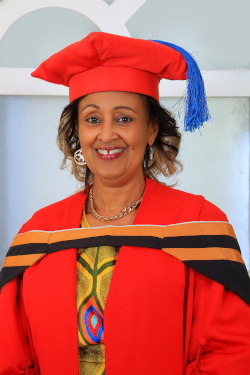News & Events
Rethinking the challenges of development in terms of decoloniality
While Ethiopia withstood physical invasion by colonial forces, it succumbed to “cognitive” invasion, posing unique challenges for the country’s development drive.

Dr Yerasework Kebede Hailu
These challenges – and solutions to them – were the crux of the doctoral research of Dr Yerasework Kebede Hailu of Unisa’s Ethiopia Regional Learning Centre (RLC).
She embarked on and completed her PhD with the support of Unisa’s Department of Research, Innovation, and Commercialisation which, through its Professional Research Committee (PRC), seeks to enhance the research capabilities and contribution of the university’s support/professional staff.
Dr Hailu, a Personal Assistant to the Ethiopia RLC Director, is a member of the Professional Research Group (PRG) and as such, benefited from training workshops and financial support for her PhD qualification.
Unisa a conducive research environment
At the Ethiopia RLC, she manages overall interaction and communication, and organises and coordinates overall activities on strategic and operational plan implementation.
However, Dr Hailu’s position is not limited to the conventional PA portfolio, it extends to her academic capacity and professional experience.
“Unisa is a conducive environment for my ambition to grow in academia,” she says.
In 2010, she registered for an MA in Development Studies, researching “the impact of decentralisation on women’s empowerment in Ethiopia: A case study of Addis Ababa City Administration”.
She graduated cum laude in 2013. “This result opened a new horizon for me to go on to the next level of study, a PhD qualification, which I registered for in 2016,” says Dr Hailu.
Unisa’s Open Distance and eLearning system enabled her to conduct research and complete her PhD studies in the recommended duration of four years.
Challenges of modernisation and development in Ethiopia
The focus of Dr Hailu’s PhD study was on the serious historicisation and theoretical critique on the challenges of modernisation and development in Ethiopia.
She says Ethiopia has a long history of pushing for modernisation and development to transform Ethiopia from a feudal “traditional” society to a ‘modern’ society.
What is unique about Ethiopia is that it survived direct colonisation when the Ethiopian forces defeated the invading colonial Italian army at the Battle of Adowa in 1896.
This means that Ethiopia has overseen its own development trajectory, unlike other African societies that languished under direct colonial administration, albeit within a world dominated by Euro-North American-centric modernity.
Nevertheless, Ethiopia did not altogether escape colonial invasion.
Infiltration by the cognitive empire
Dr Hailu’s research findings indicate that even though Ethiopia survived direct physical conquest in 1896 (the physical empire), it could not avoid invasion by the cognitive empire with its modernist tropes of progress, civilisation, development and emancipation.
This is why, just like other African states, Ethiopia became enchanted by modernity’s rhetoric, to the extent of embarking on a trajectory of self-colonisation, she says.
The key recommendation of her study is that a “decolonial turn” should be taken. Here, epistemic freedom would be the key to autonomous development trajectory, not only for Ethiopia but also for the rest of the Global South.
The study proposes rethinking the challenges of development in terms of decoloniality and scrutinising how the process of modernity/coloniality has affected the history and epistemic cultural values of society.
“The system of institutionalised Euro-America-centric modernity and models of development are dominant in the contemporary world system,” says Dr Hailu. She adds that the concept of decoloniality is an opportunity to create collaborative actions for interchange of experiences and meanings of rationality among underdeveloped South societies.
Her study calls for a closer and critical engagement between all pertinent stakeholders, including traditional and modern scholars, the society and government, with the perspective of epistemic decoloniality.
She has published an article entitled, “Did Ethiopia Survive Coloniality?” which can be accessed on DOI: https://doi.org/10.35293/jdd.v2i2.18
* By: Mpho Moloele, PR and Communications, Department of Research, Innovation and Commercialisation
Publish date: 2021-12-09 00:00:00.0

